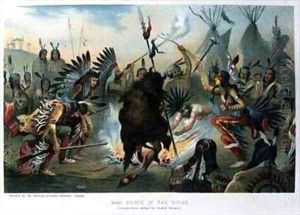Cronau, Rudolf Paintings
Rudolf Cronau was a German-American artist, illustrator, and author, known for his detailed illustrations and travel writings, particularly those capturing the American West. Born on July 1855 in Solingen, Germany, Cronau studied at the Düsseldorf Academy of Arts, where he developed his skills in painting and illustration.
Cronau's early career involved working as an illustrator for German newspapers and magazines. His talent as an illustrator was recognized, and in 1880, he was sent by the German illustrated magazine 'Die Gartenlaube' to the United States to create images of American life, landscapes, and the rapidly vanishing frontier. His journey across the United States brought him in contact with Native American tribes, whose customs and way of life he documented with great detail and sensitivity.
His illustrations from this period are notable for their historic value and artistry, capturing a time of great change in America. Cronau's work was instrumental in shaping the European perception of the American West, as his illustrations were among the few visual records available at the time.
In addition to his work as an illustrator, Cronau was also an author who wrote extensively about his travels. His writings included observations on American society, culture, and the natural environment. After his travels, he settled in the United States and continued to work as an artist and writer, becoming a bridge between German and American cultures.
Rudolf Cronau died in 1939, leaving behind a legacy of artwork and writings that continue to provide a valuable perspective on the American West during the late 19th century. His works are collected and exhibited in various museums and institutions, where they are appreciated for their historical significance and artistic quality.
